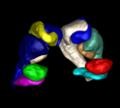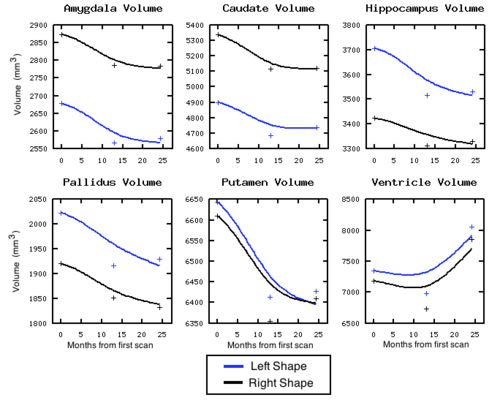Difference between revisions of "2011 Summer Project Week long shape regression"
Jfishbaugh (talk | contribs) |
Jfishbaugh (talk | contribs) |
||
| Line 36: | Line 36: | ||
<h3>Progress</h3> | <h3>Progress</h3> | ||
| − | + | ''Segmentation'' | |
| + | |||
| + | The 6 pairs of sub-cortical structures (amygdala, caudate, hippocampus, globus pallidus, putamen, lateral ventricle) were segmented using a deformable atlas based pipeline used at the University of Utah. The quality of the ventricles was very poor, so they were further improved by an active contour based segmentation tool, itkSNAP. | ||
</div> | </div> | ||
Revision as of 13:25, 24 June 2011
Home < 2011 Summer Project Week long shape regressionLongitudinal Shape Regression - Huntington's Disease
Key Investigators
- Utah: James Fishbaugh, Marcel Prastawa, Guido Gerig
- Iowa: Hans Johnson
Objective
To begin processing longitudinal Huntington's disease data and to apply our shape regression framework to available data. We are interested in the evolution of sub-cortical structures in the brain.
We would like to estimate continuous growth scenarios for several shapes of interest, which can eventually be combined with a framework for 4D registration or 4D atlas construction, to statistically analyze the growth variability within a population.
Approach, Plan
- Segment sub-cortical structures
- Estimate growth trajectories
Progress
Segmentation
The 6 pairs of sub-cortical structures (amygdala, caudate, hippocampus, globus pallidus, putamen, lateral ventricle) were segmented using a deformable atlas based pipeline used at the University of Utah. The quality of the ventricles was very poor, so they were further improved by an active contour based segmentation tool, itkSNAP.

References
Fishbaugh, J., Durrleman, S., Gerig, G. "Estimation of Smooth Growth Trajectories With Controlled Acceleration From Time Series Shape Data". MICCAI 2011. To appear.


